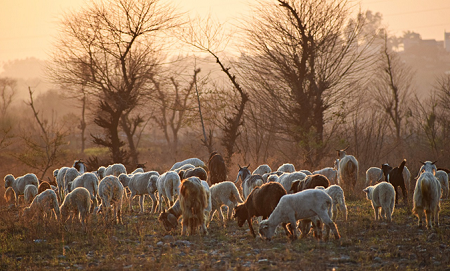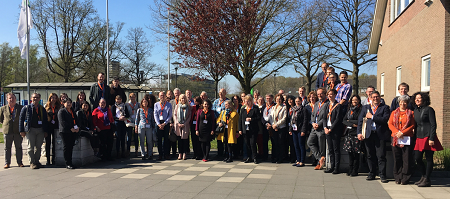SusAn
Sustainable animal production research highlighted at SusAn mid-term seminar

On the 10th and 11th of April the ERA-NET SusAn mid-term Research Project Seminar took place in Wageningen, the Netherlands. SusAn partners, policy makers and researchers from fifteen different European countries were present at this “moment where the first results can be picked”, in the words of opening speaker Peter Paul Mertens; management team member of the Department of Knowledge of the Dutch Ministry of Agriculture, Nature and Food Quality.
Sustainable animal production
As sustainable animal production is a very important topic for the Netherlands, it is no big surprise they are an active partner in the ERA-NET. The Netherlands has an intensive agricultural sector in a small space. Next to seventeen million human inhabitants on roughly thirty-four thousand square kilometre, it is also home to more than eighteen million larger farm animals (cattle, pigs, sheep, goats and horses) and over one hundred million poultry animals. The story of Dutch agriculture or ‘How a tiny country feeds the world’, as National Geographic depicted it in 2017, was referred to in both the opening speech of Peter Paul Mertens and Martin Scholten, general director of the Wageningen University Animal Science Group. Martin Scholten elaborated that the Netherlands is responsible for a very modest 2% of the world food production. Still, given the countries’ size, a quite impressive number. This high production comes with serious challenges in terms of climate change and the Paris agreement, animal welfare issues, (one-) health related questions and environmental pressure. Peter Paul Mertens stresses the importance, but also the increasing complexity of complying with national and European directives and at the same time keep production sustainable and at high levels. The new Dutch vision on circular agriculture faces these challenges, and comes up with possible solutions and the key role knowledge and innovation plays in finding such solutions. The current SusAn research projects are expected to contribute and to have impact in realising sustainable livestock production. SusAn coordinator Elke Saggau, from the German Federal Office for Agriculture and Food (BLE), underlines the importance of research and innovation in answering the challenges society is facing. She pointed out the need to do so in a coordinated transnational way which has led to the SusAn ERA-NET and the fourteen projects showcased in this seminar.
Fourteen transnational research projects
The first seminar day was reserved for the fourteen research projects to present themselves, starting with three-minute pitches showcasing the first results and how their project could contribute to a more sustainable animal production. The pitches were clustered in four groups: pig, sheep and cattle research and one group with other livestock animals (poultry and bees) or general issues. Research projects focus on a range of topics, from alternative castration techniques to novel non-food and local cattle feed sources, from increasing genetic diversity and cross-breed traits for both high-production and resilient animals to improved housing systems that both enhance animal welfare and find clever solutions for manure recycling. The projects clearly take the impact of their results on the end-users into account, on a farm-scale level or in more comparative assessments. For example the project ‘Animal Future’1; a collaboration between Austrian, British, Dutch, French, German, Portuguese and Spanish researchers, that aims to develop a decision support system that enables a science-based evaluation of innovations from the ground. In order to do so, they define a set of innovative practices and their potential benefits and costs, quantify the impact of these innovative practices on the benefit-cost portfolio at four levels (farm, regional, national and EU), and are developing an evidence-based and easy-to-use tool enabling animal production actors to select the most appropriate innovative practices for a specific sector, region and level. There is no one solution fits all, and that needs to be integrated in a support system. As was discussed among the researchers that the organic way of farming has advantages in terms of animal welfare, but may not be achievable in several countries in terms of land use and greenhouse gas emissions.
Impact
What will be the -hoped for- impact of the joint research funded through the SusAn ERA-NET? And why should policy makers keep on funding transnational research cooperation? When asked, Peter Paul Mertens explains how 2030 is an important milestone year for many transitions that will have to take place. With this deadline in mind, now is the time for innovative solutions and knowledge development that can deliver within the next three to five years. Transnational cooperation like in the SusAn ERA-NET is based on a multi-actor approach that is expected to make a translation from research to actual applied approaches easier. This fits well with the Dutch approach to research and innovation. Several of the project presentations offer potentially interesting aspects for the Dutch but also European economy and animal production systems. If we can find alternatives for cattle feed that are produced more local and are not in competition with human food, the gain would be substantial both in terms of sustainability and economically: The Netherlands is a large importer of cow feed.
Transnational research cooperation in general is interesting and beneficial, because countries learn a lot from each-others’ experiences and it helps in avoiding unnecessary duplication of research. Some innovations can be adapted to the national setting and developed further again. Mechanisms that facilitate this kind of cooperation, like ERA-NETs, are a great way of getting experts together: it facilitates learning and creates an opportunity; a chance, for scientists to come up with disruptive innovations. It is important that policy makers facilitate the organisation of such ‘chances’ for new, exciting research breakthroughs to happen.
The two-day seminar was organised by the Dutch Ministry of Agriculture, Nature and Food Quality (LNV), the Netherlands Enterprise Agency (RVO), and other partners of the ERA-NET SusAn. In the ‘Impulse’ building of Wageningen University and Research, the seminar showcased the first results of fourteen projects on sustainable animal production, of which in six of them, researchers from Wageningen University and Research are involved.
In addition to exchanging on the research projects and results, the seminar also included sessions on stakeholder involvement in research, valorisation of knowledge and the development of a SusAn Strategic Research Agenda on sustainable animal production.

The SusAn ERA-NET mid-term research project seminar meeting in Wageningen, April 2019
1AU: Universitaet Klagenfurt; DE: Bayerische Landesanstalt fur Landwirtschaft; ES: Centro de Investigacion y Tecnologia Agroalimentaria de Aragon; FR: INRA, Institut de l’Elevage; NL: Wageningen University; PT: Associação do Instituto Superior Técnico para a Investigação e Desenvolvimento; UK: Scotland’s Rural College.
